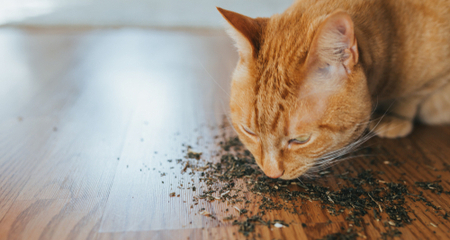Witness a remarkable transformation in your kitten's behavior simply by introducing some catnip into their vicinity. Discover the intriguing nature of this plant and why it has such a profound effect on our furry feline friends. Prepare to unravel the mysteries of cats and catnip with this comprehensive guide, providing you with all the essential knowledge you need.
What is catnip?
Catnip, scientifically known as Nepeta cataria, is a herb that belongs to the mint family. While it was originally prevalent in certain regions of Asia and Europe, it has successfully spread to various parts of the globe. You may have come across it growing alongside rural roads or even as a resilient plant in people's gardens, as it possesses the ability to withstand drought conditions.
Catnip effects on cats: what does catnip do to cats?
Observe your cat's sheer delight as they encounter the captivating allure of catnip. Watch as they engage in a frenzy of licking and rubbing against the plant, their behavior taking on a peculiar and exhilarating transformation. Witness their hyperactivity as they stretch, drool, or engage in playful jumps. Some cats may even embark on a spirited sprint throughout the room. However, it's important to note that reactions can vary depending on the individual cat, with some exhibiting more tranquil or subdued responses.
It's crucial to understand that the effects of catnip on cats are temporary, typically subsiding within approximately half an hour as their brief immunity sets in. Following a euphoric reaction, it's not uncommon for cats to remain still until the effects gradually fade away.
How does catnip work its magic on cats?
The key player in catnip's effects is an organic compound called nepetalactone. When a cat comes into contact with catnip and inhales the scent, nepetalactone binds to the olfactory cells in their nose, sending signals to the brain.
Nepetalactone is stored in tiny microscopic bulbs that coat the leaves, stems, and pods of the catnip plant. These bulbs release the compound when they are crushed, chewed, or when a cat rubs against them.
But why do cats like catnip?
The exact reason behind their peculiar reactions is still not fully understood. Some scientists believe that the brain interprets nepetalactone as cat pheromones, triggering abnormal behavior in response. Additionally, catnip is thought to act as a natural mood enhancer, which could explain why cats are so fond of it.
Why do some cats not respond to catnip?
It turns out that not all cats are affected by catnip in the same way. Approximately 30% of cats do not show any reaction to it. Researchers speculate that this may be a genetically inherited trait, where the gene responsible for the "catnip reaction" is either absent or inactive. Interestingly, both kittens and senior cats are less likely to be affected as well.
And catnip's allure isn't limited to domestic cats alone. Even big cats like lions and tigers can display a reaction to catnip!
How to give catnip to your cat
Catnip can be a useful tool to encourage positive behavior in your cat. If you have an indoor cat that needs more exercise, adding a touch of catnip to their favorite toys can make playtime even more enticing and engaging.
Additionally, catnip can be a powerful motivator for your cat to interact with specific toys. For example, if you want to redirect their scratching behavior from furniture to a scratching post, rubbing some catnip into the post or sprinkling it at the base can attract your cat's attention and encourage them to explore and use the post.
The captivating effects of catnip on cats can also be utilized to ease travel anxiety. If your cat tends to feel stressed during car journeys, you can sprinkle some catnip in their carrier to help create a more relaxing and comfortable experience for them.
Whether your cat responds with hyperactivity or a more relaxed state, catnip can be a helpful aid in various situations to promote positive behavior and reduce stress.
Is catnip safe for my cat?
Catnip is generally considered safe for cats, and there is no evidence to suggest that it can be harmful to them. Cats are typically good at self-regulating their intake of catnip, making overdose unlikely. However, prolonged and excessive use may decrease its effectiveness, so it's best to use catnip for cats only when necessary.
Can cats eat catnip?
Yes, cats can eat catnip, and it is safe for them to do so. If they consume a large amount of the herb, they may experience mild digestive upset. However, since most cats are attracted to the smell rather than the taste of catnip, consuming large quantities is unlikely.
Do humans react to catnip?
While humans do not experience the same euphoric effects as cats, some people use catnip as an alternative medicine. It is believed to have various uses, such as alleviating insomnia, migraines, and even reducing swelling and arthritis when applied topically. Additionally, catnip can be used as a mosquito repellent, although its effectiveness may not be as long-lasting as DEET-based products.
In conclusion, catnip is safe for cats, and while humans may not experience the same reactions, it has potential uses as an alternative remedy and even as a natural mosquito repellent.



.jpeg)